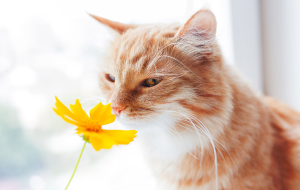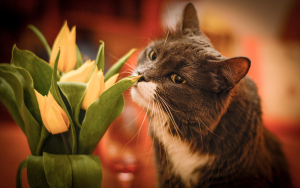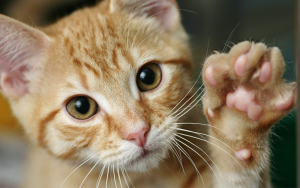Why Is My Cat Meowing So Much? Understanding the Causes and Solutions

Introduction
If you’ve found yourself asking, “Why is my cat meowing so much?” you’re not alone. Cats communicate with us in various ways, and meowing is one of their primary methods of interaction. However, when your feline friend’s
vocalizations increase significantly, it can be a cause for concern. While occasional meowing is normal, persistent or excessive meowing may indicate an underlying issue. In this article, we’ll explore the potential causes behind your cat’s increased
meowing, what it might mean, and how to address the behavior.
Understanding Cat Meowing Behavior
Before diving into the reasons behind excessive meowing, it’s important to understand why cats meow in general. Unlike other animals, domestic cats often use meowing specifically to communicate with
humans. In the wild, cats may meow to their kittens or other cats, but house cats have adapted to using this vocalization to express their needs or feelings toward their human companions.
In a typical cat-human relationship, meowing can indicate hunger, curiosity, or a desire for attention. However, when meowing becomes more frequent or intense, it might be a sign of something more serious. Let’s examine the possible reasons why your cat
may be meowing excessively.
1. Hunger or Thirst
One of the most common reasons for increased meowing is hunger or thirst. Cats are creatures of habit, and they often meow to signal that it’s time for their meal. If your cat’s usual feeding schedule has changed or if they feel their food bowl is empty,
they might use meowing to remind you to fill it up.
Additionally, if a cat feels that they haven’t had enough water, they may vocalize more frequently. Cats can be picky about their water sources, and sometimes they meow to get your attention toward their water dish.
Solution: Ensure your cat is being fed on a regular schedule with high-quality food and fresh water. If they continue to vocalize around feeding times, try adjusting the portion sizes or exploring different food types.
2. Loneliness or Attention-Seeking
Cats are affectionate animals, and they often meow when they want attention from their owners. If your cat is left alone for extended periods, they may feel lonely or anxious and respond by meowing. This can also happen if your cat is not receiving enough
stimulation or interactive playtime during the day.
In many cases, cats meow to initiate play or to ask for petting or cuddles. If your cat notices that meowing leads to more attention, they may continue the behavior in an attempt to get your attention.
Solution: Increase your cat’s engagement by providing more interactive playtime and attention. Spend quality time with your cat, pet them, and play with them using toys that stimulate their natural hunting instincts. If you’re gone for
extended hours, consider adopting another pet for company.
3. Medical Issues
Excessive meowing can also be a sign that your cat is experiencing pain or discomfort. Cats are experts at hiding pain, so when they meow more frequently than usual, it may be their way of signaling that something is wrong. Common health issues that could
lead to increased vocalizations include:
- Dental problems: Toothaches or gum disease can cause discomfort, leading to more meowing.
- Urinary issues: Conditions like urinary tract infections (UTIs) or bladder stones are often accompanied by meowing, especially if the cat is having difficulty urinating or is in pain.
- Hyperthyroidism: This is a common condition in older cats and is known to cause increased vocalizations, along with weight loss, increased appetite, and hyperactivity.
- Arthritis or joint pain: Older cats, in particular, may vocalize more if they have joint pain or arthritis.
Solution: If you notice any signs of illness, such as lethargy, changes in appetite, litter box habits, or unusual behavior, take your cat to the vet for a full check-up. A professional diagnosis is crucial in addressing any underlying
health issues.
4. Stress or Anxiety
Just like humans, cats can experience stress or anxiety, which can result in excessive meowing. Stressors for cats may include changes in their environment, such as moving to a new house, the introduction of new pets or people, or even changes in your
routine. Cats are creatures of habit, and any disruption can cause them to feel anxious, leading to increased vocalizations.
Solution: To minimize stress, keep your cat’s environment as consistent as possible. If you’re moving or introducing a new pet, try to make the transition gradual. Provide safe spaces for your cat to retreat to when they need a break.
Additionally, consider using calming products, such as pheromone diffusers, to help alleviate anxiety.
5. Age-Related Cognitive Dysfunction (Cat Dementia)
Older cats, particularly those over the age of 10, can develop cognitive dysfunction syndrome (CDS), which is similar to dementia in humans. Cats with CDS may exhibit confusion, disrupted sleep patterns, and increased vocalization, particularly at night.
This behavior can be distressing for both the cat and their owners.
Solution: If your older cat seems disoriented or is meowing excessively at night, consult with your veterinarian. They may recommend medications or dietary changes to help manage the symptoms of CDS.
6. Territorial Behavior
Cats are territorial creatures, and meowing can sometimes be a sign of territorial disputes. If your cat hears or sees another animal outside, such as a neighborhood cat or stray animal, they may meow as a way of asserting their dominance or expressing
frustration. This is particularly common if your cat is an indoor/outdoor cat.
Solution: If territorial meowing is an issue, consider keeping your cat indoors or limiting their outdoor access. This will help reduce the number of potential interactions with other animals that may trigger vocalizations.
7. Disorientation or Hunger Due to Environmental Changes
Changes in the environment, such as rearranging furniture or introducing new household items, can also confuse your cat, especially if they are not accustomed to such changes. Cats tend to have a strong attachment to the layout of their home, and anything
that disrupts this sense of security can cause vocalization as they try to make sense of the changes.
Solution: Be mindful of how changes affect your cat. Try to make adjustments gradually, and if possible, ensure that your cat’s space remains familiar to them. Provide plenty of comfort items, such as their favorite bed or blanket, in
the new setting.
8. Boredom and Lack of Stimulation
Just like other pets, cats require mental stimulation to stay happy and healthy. A lack of entertainment can lead to boredom, which often results in excessive meowing. Boredom-induced meowing is common in indoor cats who do not have access to natural
outdoor stimuli, such as hunting or exploring.
Solution: Provide a variety of toys and enrichment activities for your cat, such as puzzle feeders, scratching posts, or cat trees. Interactive toys, such as laser pointers or feather wands, can also engage your cat and satisfy their
need for mental stimulation.
9. Breeding Behavior
If you have an unspayed female cat, she may be meowing excessively due to mating behaviors, particularly if she is in heat. Female cats in heat will vocalize loudly to attract male cats, and this can result in persistent meowing. Male cats, too, can become
quite vocal if they detect a female in heat nearby.
Solution: The most effective solution is to have your cat spayed or neutered. Not only will this prevent unwanted pregnancies, but it will also reduce the likelihood of mating-related behaviors, including excessive meowing.
Conclusion
If your cat is meowing more than usual, there could be a variety of reasons behind the behavior. While some causes, like hunger or attention-seeking, are relatively harmless, others may signal underlying medical issues,
stress, or age-related conditions. The key is to observe your cat’s overall behavior and take appropriate action based on the circumstances. If you’re unsure about the cause or if your cat’s meowing persists, it’s always best to consult with your
veterinarian to rule out any potential health concerns. By understanding the reasons behind your cat’s vocalizations, you can improve their well-being and strengthen the bond you share with your feline friend.
FAQs
-
What is considered normal meowing for a cat?
Normal meowing varies, but most cats meow for food, attention, or to greet their owners. Short meows are typical, but if your cat is meowing excessively or at odd times, it couldbe a sign of an issue.
-
Can a cat’s meowing mean they are in pain?
Yes, excessive meowing can indicate that a cat is in pain or discomfort. If your cat is also displaying other signs of distress, such as hiding, lethargy, or changes in behavior, it’simportant to consult a vet.
-
How can I stop my cat from meowing so much?
The first step is to identify the cause. Ensure your cat is well-fed, hydrated, and mentally stimulated. If the meowing persists, a vet visit may be necessary to rule out health problems. -
Does age affect a cat’s meowing habits?
Yes, older cats may meow more due to cognitive dysfunction, pain, or changes in their environment. Consult with a veterinarian if your senior cat’s behavior changes.







